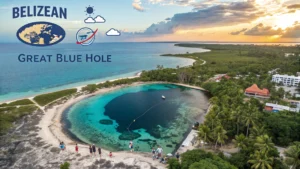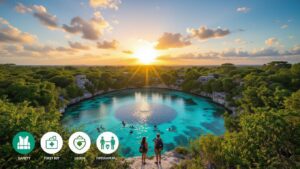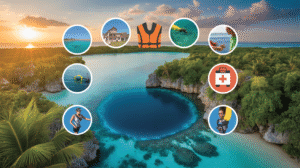Belize is renowned as a top-tier Caribbean vacation spot, attracting countless visitors due to its stunning natural beauty and rich culture. However, it is crucial for those planning to explore this breathtaking paradise to take necessary precautions to ensure their safety and well-being during their stay. This comprehensive guide offers the latest crime statistics, government advisories, and personal experiences to equip travelers with essential insights needed to experience Belize’s incredible beaches, lush jungles, and awe-inspiring ancient ruins while prioritizing their safety and security.
1. Stay Informed About Current Crime Rates and Trends in Belize
As of 2024, Belize has reported a homicide rate of 21.7 per 100,000 residents, indicating a slight increase from the previous year’s rate of 21.5. Encouragingly, there was a remarkable decline in homicide cases by 29 percent during the first half of 2025 compared to the same period in 2024, with 41 incidents reported compared to 58. The CompStat report from the Belize Police Department highlights that overall major crimes have also decreased by 9 percent, falling from 536 in H1 2024 to 489 in H1 2025. This positive trend is attributed to significant reductions in murder (–29 percent), robbery (–15 percent), and theft (–26 percent), presenting a hopeful outlook for safety for both residents and tourists alike.
| Crime Category | Jan–Jun 2024 | Jan–Jun 2025 | Change |
|---|---|---|---|
| Major crimes | 536 | 489 | –9 percent |
| Murders | 58 | 41 | –29 percent |
| Robbery | – | – | –15 percent |
| Theft | – | – | –26 percent |
2. Gain Insight into Key Government Travel Advisories for Your Belize Trip
- U.S. Department of State: Currently, Belize is assigned a level of Level 2: Exercise Increased Caution due to the ongoing risk of violent crime, which includes sexual assault, home invasions, armed robberies, and murder. Importantly, the Southside of Belize City is classified as Level 3: Reconsider Travel, where it is advisable to avoid areas that are not frequented by tourists situated south of Haulover Creek. Source: U.S. Department of State
- Government of Canada: Canadian travelers are urged to exercise a high degree of caution throughout the country, with specific recommendations to avoid non-essential travel to Southside Belize City due to ongoing gang-related and drug-related violence. Source: Government of Canada
- UK FCDO: The UK Foreign, Commonwealth & Development Office warns that Belize has one of the highest murder rates globally per capita, with serious gang-related violence primarily affecting the Southside of Belize City. Nonetheless, other areas such as San Pedro, Caye Caulker, Placencia, and San Ignacio generally remain safe for travelers who implement proper precautions. Source: UK Foreign, Commonwealth & Development Office
3. Identify High-Risk Areas and Common Crimes in Belize
- Belize City (Southside): This area is infamous for gang activity, which significantly contributes to the high rates of violent crime. It is strongly recommended to avoid non-tourist neighborhoods, especially after sunset, to ensure your personal safety.
- Border Zones: Regions near the borders are experiencing heightened smuggling activities and cross-border violence, particularly with Guatemala; travelers should remain vigilant in these areas.
- Petty Crime Hotspots: Locations like San Pedro are known for instances of pickpocketing and credit card fraud. Always remember to shield your PIN when using ATMs and prefer machines located within bank premises for enhanced security.
4. Adopt Proactive Safety Measures for a Secure Experience in Belize
Enhancing Your Personal Security During Your Belize Adventure
- Stay alert: It is crucial to avoid walking alone at night, especially in urban areas such as Belize City and Belmopan, where the likelihood of crime tends to be higher.
- Protect your valuables: Always utilize hotel safes for important items and keep wallets and mobile devices out of sight to deter potential thieves.
- Exercise caution with drinks: Never accept food or beverages from strangers, as this can lead to dangerous situations.

Essential Transportation Safety Tips for Travelers in Belize
- Road Conditions: Be informed that most secondary roads in Belize are unpaved and poorly illuminated. It is wise to drive only during daylight hours and ensure your fuel tank is full before embarking on longer journeys.
- Public Transport Awareness: Public buses may lack adequate maintenance—it’s advisable to avoid using them if possible. When opting for licensed taxis, be aware that they are not regulated by meters; hence, negotiating your fare beforehand is essential to prevent misunderstandings.
- Ferry Safety Precautions: When traveling between the cayes, ensure that life jackets are readily available and that vessels are not overcrowded to guarantee safe transit.
Participating in Adventure Activities with Safety as a Priority
- When engaging in adventure activities such as scuba diving, zip-lining, and cave tubing, always choose reputable operators. Verify their safety records and equipment standards to ensure your safety; consider obtaining travel insurance that includes medical evacuation coverage for added protection.
- Only swim in designated areas; riptides are common, and lifeguards are often scarce, making it crucial to prioritize safety when in the water.
Vital Health Precautions for Travelers Heading to Belize
- Vaccination Advice: Although there is no entry requirement for yellow fever, it is strongly recommended to receive vaccinations against hepatitis A, hepatitis B, typhoid, and rabies before traveling to Belize. For comprehensive information, consult the CDC guidelines.
- Mosquito Bite Prevention: Given the year-round risk of diseases such as dengue, chikungunya, and Zika, it is essential to use EPA-approved insect repellent, wear long-sleeved clothing, and sleep under mosquito nets to minimize exposure.
- Food and Water Safety Measures: Follow the principle of “boil it, cook it, peel it, or leave it” regarding food and water. Carry oral rehydration salts to efficiently manage traveler’s diarrhea and ensure you remain hydrated throughout your travels.
5. Special Considerations for Women, Children, and LGBTQ+ Travelers in Belize
- Women traveling alone should exercise increased caution to avoid isolated areas and dimly lit alleys, as there have been reports of harassment in certain parts of the country.
- Members of the LGBTQ+ community may face social stigma in Belize; it is advisable to avoid public displays of affection to ensure personal safety.
- Children traveling alone or with only one parent must carry notarized parental consent letters, as immigration officials in Belize strictly enforce this regulation for child travel.

6. Accessing Emergency Services and Consular Support When in Belize
- In case of emergencies, always dial 911 for immediate assistance, whether you require medical, fire, or police services in Belize.
- The U.S. Embassy located in Belmopan and the Canadian Honorary Consul in Belize City can provide assistance with matters such as arrests, detention, or other emergencies. For further information, visit U.S. Embassy Belmopan.
- Ensure you register with your government’s traveler-registration program, such as STEP for U.S. citizens or the Registration of Canadians Abroad for Canadians, to stay informed and receive necessary assistance during your travels.
A Comprehensive Bibliography for Informed Travelers to Belize
- Belize Police Department’s CompStat report
- U.S. Department of State Belize Travel Advisory
- Government of Canada Travel Advice for Belize
- UK Foreign, Commonwealth & Development Office Advice
- CDC Traveller’s Health: Belize
- U.S. Embassy Belmopan
The Article Is Belize Safe to Visit? 2025 Complete Safety Guide for Smart Travelers appeared first on Belize Travel Guide
The Article Belize Safety Guide 2025: Essential Tips for Smart Travelers Was Found On https://limitsofstrategy.com
The Article Belize Safety Guide: Key Tips for Savvy Travellers 2025 First Appeared ON
: https://ad4sc.com

No responses yet